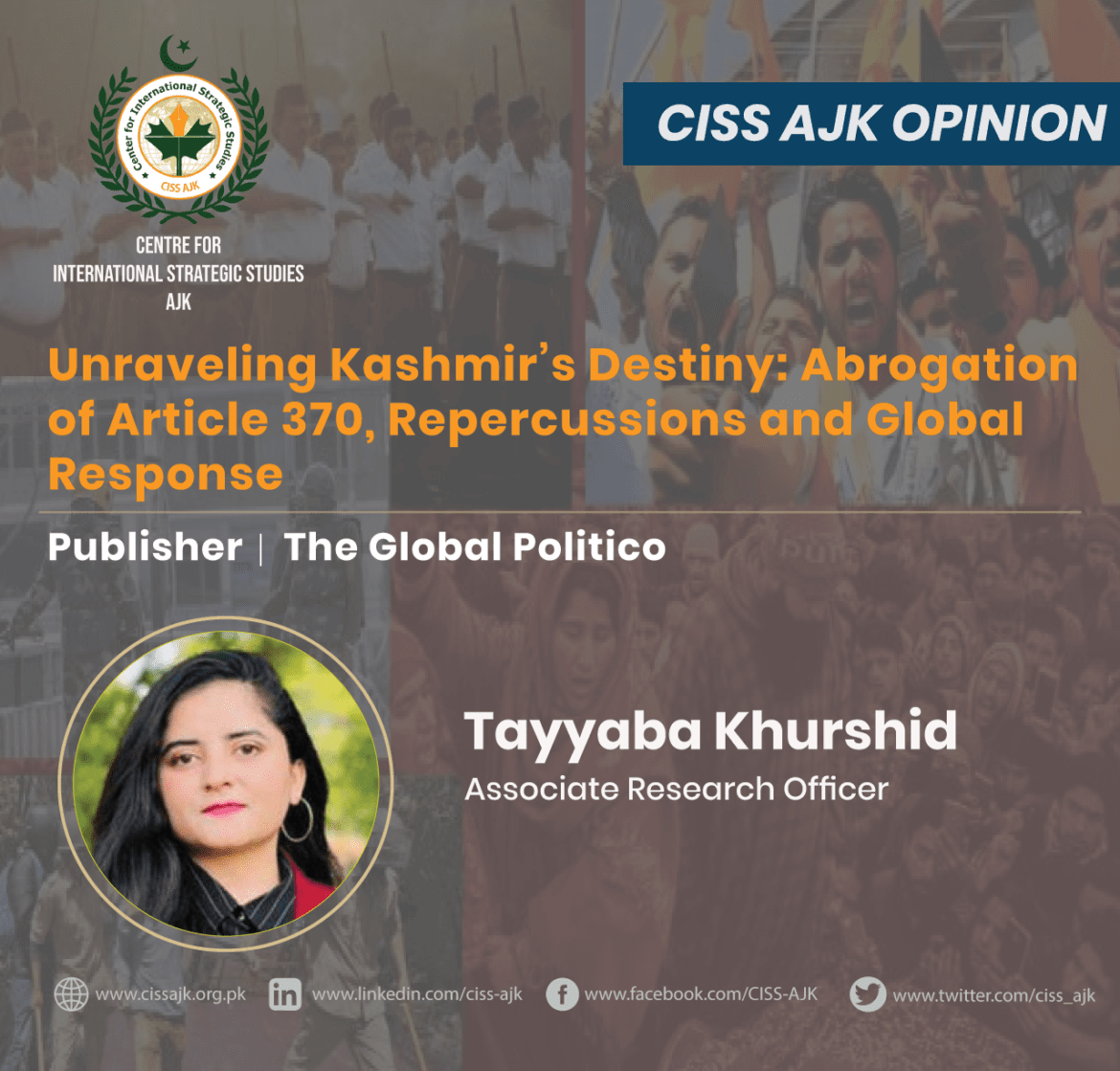651

In the annals of India’s constitutional history, few decisions have sparked as much debate, introspection, and consequence as the abrogation of Article 370, which granted special autonomous status to the region of Jammu and Kashmir. Four years have elapsed since this momentous step was taken, marking a significant juncture to reevaluate the implications and aftermath of this decision. Article 370, a provision entrenched in the Indian Constitution, had been a key pillar of the complex relationship between the central government and the state of Jammu and Kashmir. Article 370 held profound significance for the people of Kashmir, shaping their identity, autonomy, and relationship with the Indian state. The provision was incorporated into the Indian Constitution at the time of Jammu and Kashmir’s accession to India in 1947, and granted the region a degree of special autonomy, allowing it to have its own constitution, flag, and significant legislative powers. The autonomy granted under Article 370 extended to matters of governance, land ownership, and citizenship. For instance, only permanent residents of Jammu and Kashmir were entitled to own property in the state. Kashmiri students were beneficiaries of special scholarships and quotas in educational institutions. Government jobs in the state were primarily reserved for residents, bolstering local employment opportunities and fostering a sense of economic security. It allowed the region to have its own constitution and flag, reinforcing a distinct sense of identity among Kashmiris. This autonomy played a role in preserving the region’s unique cultural heritage and traditions, which were integral to the local populace’s way of life. It represented a symbol of autonomy and a historical link to the past, embodying a sense of agency and self-determination for Kashmiris. The retention of this provision was often seen as an acknowledgment of the region’s distinct history and its aspirations for a future that respected its individuality.
However, India under BJP government of Prime Minister Narender Modi unilaterally and illegally revoked article 370 and 35A of the Indian constitution sidelining the 76 years of longstanding dispute between India and Pakistan and 18 UNSC resolutions calling for a free and fair plebiscite where right of self-determination of Kashmir is preserved. These articles, were revoked by the Indian government on August 5, 2019, fundamentally altering the constitutional framework and political landscape of Jammu and Kashmir.
Article 370 & 35-A: Guarantying Special Status and Autonomy of IOK
Article 370 had granted Jammu and Kashmir a unique status within the Indian Union. This provision allowed the state a considerable degree of autonomy, enabling it to have its own constitution, flag, and legislative powers. Under Article 370, laws passed by the Indian Parliament applied to Jammu and Kashmir only if the state’s government concurred with them. This arrangement aimed to recognize the region’s historical and political distinctiveness while fostering a sense of identity among its people. Article 35A, which derived its authority from Article 370, empowered the Jammu and Kashmir state legislature to define “permanent residents” and grant them certain rights and privileges. This included the exclusive right to own property and access to state government jobs, among other benefits. The intent behind Article 35A was to protect the cultural and economic interests of the state’s residents, safeguarding them from potential demographic changes that could arise due to migration.
Article 370 Scrapping: Pakistan’s Diplomacy and Global Response
The Indian government’s decision to abrogate Article 370 and 35A was primarily rooted in the goal of integrating Jammu and Kashmir more fully into the Indian Union. The move was accompanied by a simultaneous decision to reorganize the state into two separate union territories – Jammu and Kashmir, and Ladakh. The abrogation of Article 370 and 35A raised concerns about potential demographic changes, erosion of local identity, and the manner in which the decision was executed. Internationally, the move sparked diplomatic reactions and concerns. Pakistan strongly protested the decision, viewing it as a violation of bilateral agreements and an affront to the rights of the people of Jammu and Kashmir. The global community closely monitored the developments, urging restraint and peaceful resolution of any disputes that might arise from the abrogation. This triggered significant changes on the ground. It led to the alteration of land ownership laws, opening up the region to non-residents for the first time in decades. The political landscape also transformed, with Jammu and Kashmir losing its special autonomous status and its former statehood.
It also raised significant human rights concerns among Human Rights Organizations. The decision prompted debates about the balance between security imperatives and the protection of civil liberties, with observers closely monitoring the situation for potential violations.
One of the primary concerns after the abrogation that was raised by Pakistan, Human rights groups and UN was the imposition of security measures, including communication blackouts, curfews, and the deployment of additional security forces. While the government stated that these measures were necessary to maintain law and order and prevent potential violence, they also raised apprehensions about their impact on the basic rights of the local population, including freedom of movement and the right to access information. The revocation saw the detention of numerous political leaders, including former chief ministers of the state. Their arrest raised concerns about the curtailment of political dissent and the right to political participation. It’s argued that such detentions stifled democratic discourse and limited the ability of the local population to express their views on the decision. The clampdown on communication, including internet and phone services, had significant implications for the freedom of expression and the media. Journalists faced challenges in reporting and disseminating information, affecting their ability to function independently and hold authorities accountable. The restriction on information flow also hindered the ability of the local population to communicate and access vital services. Various reports emerged suggesting incidents of human rights violations, including allegations of excessive use of force, arbitrary detentions, and allegations of torture. These reports underscored the need for transparency, accountability, and mechanisms to address any abuses that might occur in the aftermath of the abrogation. The prolonged security measures and communication lockdowns disrupted the daily lives and livelihoods of the people of Jammu and Kashmir. Businesses, education, healthcare, and other essential services were severely impacted, affecting the well-being and quality of life of the local population. The revocation of article 370 not only aimed to pacify the issue and normalize Kashmir issue.
The actions taken by Prime Minister Modi have only added complexity to the already protracted Kashmir conflict, as is often the case with such long-standing disputes. The Kashmir issue requires the attention of the international community, given its duration of 76 years, and it is essential for them to play an active role in finding a resolution.
The Kashmiri people have consistently rejected Indian occupation over the past 76 years, and this sentiment was visibly evident during recent protests in Kashmir including Muzaffarabad, where slogans rejecting Indian occupation and illegal actions were raised. Notably, a significant number of Kashmiri refugees, who had fled due to Indian oppression, participated in these demonstrations.
The United Nations Security Council held three closed-door sessions to address the Kashmir issue. Additionally, the US Congress passed a resolution on the Kashmir dispute, and a special session of the Organization of Islamic Cooperation (OIC) was convened, with a delegation visiting Pakistan to discuss the situation. These actions were triggered by Modi’s measures to suppress the voices of Kashmiris, leading to increased international attention on the Kashmir issue. Regrettably, the international community’s efforts to sustain and enhance these steps have been ineffective. The UN Security Council’s activities proved futile, and the UN has been unable to implement its own resolutions, leaving the Kashmiri people at the mercy of India for 76 years, resulting in violations of their identity and dignity.
Conclusion:
In a nutshell, over the past four years, Kashmir has been facing Indian state-sponsored terrorism. India is terrorizing the Kashmiri population by stifling their voices, implementing economic terrorism, employing force, and engaging in political engineering. In order to make the Kashmiri case more effective firstly, there is a need to expand the knowledge base of those representing Kashmir on various forums, ensuring a comprehensive understanding of the dynamics of the Kashmir issue. To effectively communicate the Kashmir issue internationally, it is vital to present it in an academic manner, supported by statistics and references. This approach would help convey the gravity of the situation in a language that the international community can understand and resonate with, thereby garnering support for a just and peaceful resolution to the long-standing conflict Secondly, it is essential to increase diplomatic efforts and reach out to countries that have not been engaged before. Thirdly, regardless of a country’s size, its vote carries equal importance in the United Nations, making it crucial to garner support from all nations. Finally, the importance of communicating with the international community in a language that resonates with people, ensuring that the message is effectively conveyed and understood. These measures, coupled with consistent advocacy, are imperative to advance the Kashmir cause and seek a just and peaceful resolution to the long-standing conflict.
Tayyaba Khurshid is Associate Research Officer at Centre for International Strategic Studies AJK and MPhil scholar of International Relations at Quaid-e-Azam University, Islamabad.

